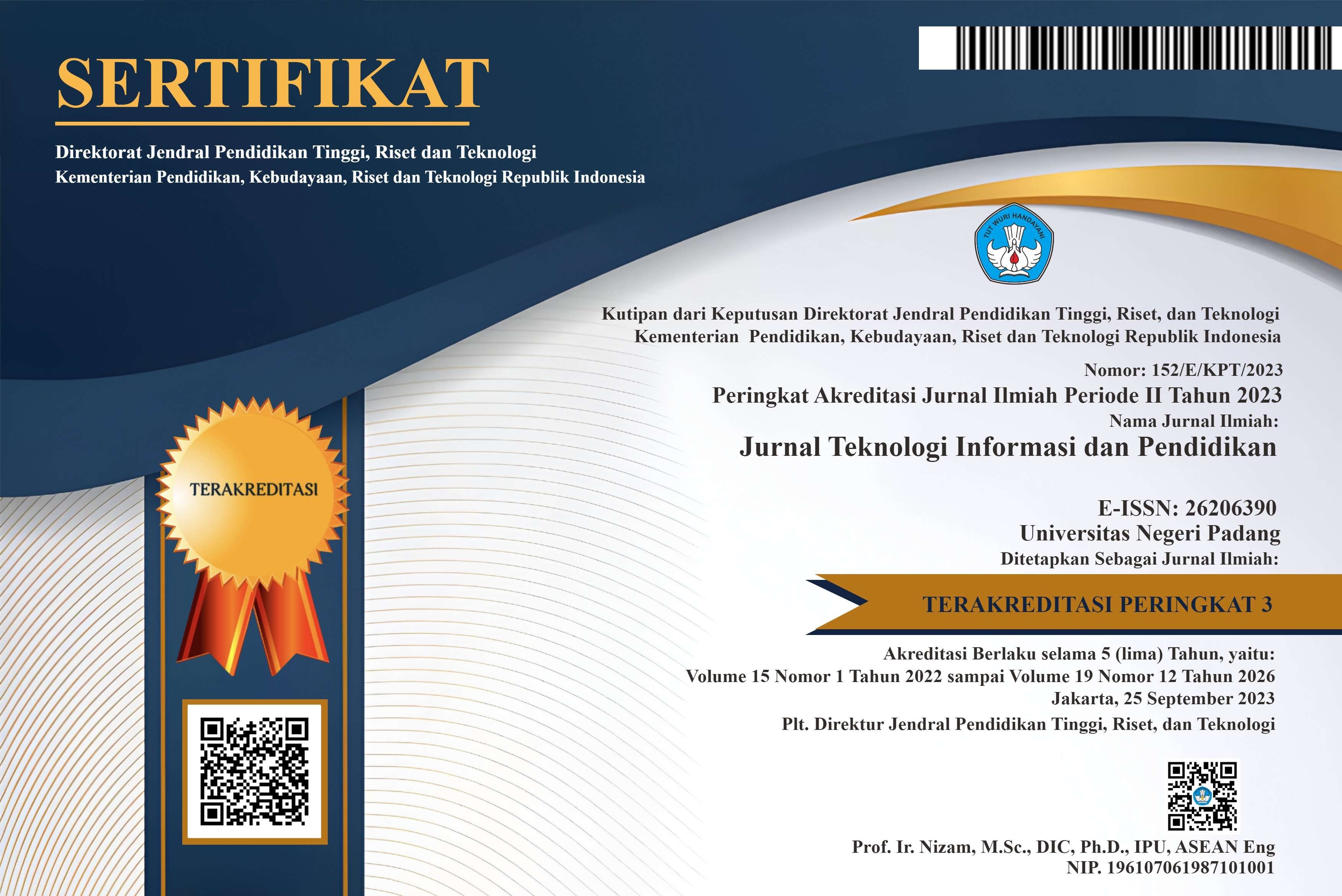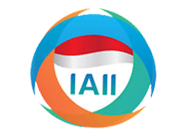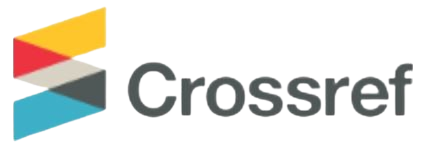Analysis of Student Satisfaction with the Group Investigation of Digital Entrepreneurship (GIDE) Application Using the Servqual Method
DOI:
https://doi.org/10.24036/jtip.v18i1.957Keywords:
Analysis, Student satisfaction, GIDE, servqual, ApplicationAbstract
Group Investigation of Digital Entrepreneurship (GIDE) application is a form of learning information technology applied in the field of education. The problem that occurs is that there are still students who have difficulty in using and accessing the GIDE application. This study aims to determine the level of satisfaction of students who have used the GIDE application as a medium in learning. The method used in this research is the Servqual (Service Quality) method. This method is used to identify and prioritise customer satisfaction, in this case students in higher education. The dimensions used in this study are reliability, responsiveness, assurance, empathy, and tangible. The results showed that student satisfaction with the GIDE application was said to be satisfied. The results of testing all tangible variables with an expected value of 0.75 and a reality value of 0.81, reliability with an expected value of 0.77 and a reality value of 0.82, responsiveness with an expected value of 0.80 and a reality value of 0.81, assurance with an expected value of 1.03 and a reality value of 1.13, empathy with an expected value of 1.13 and a reality value of 1.12. of the five dimensions show the level of user satisfaction (students) is included in the ‘Satisfied’ category.
References
S. Khoziyah and E. E. Lubis, “Pengaruh Digital Marketing Terhadap Keputusan Pembelian Followers Online Shop Instagram @KPopConnection,” J. Ilmu Komun., vol. 10, no. 1, pp. 39–50, 2021.
I. Yulaikah and S. Rahayu, “Efektivitas Pembelajaran STEM dengan Model PjBL Terhadap Kreativitas dan Pemahaman Konsep IPA Siswa Sekolah Dasar,” J. Pendidik. Teor. Peneitian, dan Pengemb., pp. 223–229, 2022.
S. R. Ningsih, A. I. Suryani, and I. T. Maulana, “The Implementation of Group Investigation E-Task in Activities Learning ( GIETAL ) in Higher Education,” EJEL J., vol. 20, no. 2, pp. 120–133, 2022.
M. H. Santoso and Soeryanto, “Analisis Metode Pembelajaran Kooperatif Jigsaw Untuk Meningkatkan Keaktifan Dan Hasil Belajar Siswa,” JPTM Univ. Negeri Surabaya, vol. 11, no. 01, pp. 1–10, 2021.
H. S. Rukmi, D. Novirani, and A. Hada, “Analisis Kepuasan Konsumen Terhadap Kualitas Pelayanan Toko Oleh-Oleh,” J. Muara Ilmu Ekon. dan Bisnis, vol. 1, no. 1, p. 115, 2017, doi: 10.24912/jmieb.v1i1.413.
A. Fujianto, “Analisis Kepuasan Pengguna Akhir Aplikasi Pln Mobile Menggunakan Metode Eucs (End User Computing Satisfaction) Berdasarkan Prospektif Pelanggan Pt.Pln (Persero) Up3 Jember Skripsi,” Digit. Repos. Univ. Jember, 2019.
M. A. Sugandi and R. M. N. Halim, “Analisis End-User Computing Satisfaction (Eucs) Pada Aplikasi Mobile Universitas Bina Darma,” Sistemasi, vol. 9, no. 1, p. 143, 2020, doi: 10.32520/stmsi.v9i1.625.
O. Candra, U. Usmeldi, D. T. P. Yanto, and F. Ismanto, “Pengembangan Perangkat Pembelajaran Berbasis Praktikum Inkuiri Untuk Mata Pelajaran Menganalisis Rangkaian Listrik,” JINoP (Jurnal Inov. Pembelajaran), vol. 6, no. 1, p. 62, 2020, doi: 10.22219/jinop.v6i1.11756.
E. Creely and D. Lyons, “Designing flipped learning in initial teacher education : The experiences of two teacher educators,” Australas. J. Educ. Technol., vol. 38, no. 4, pp. 40–54, 2022.
B. S. A. Pasang and S. A. M. Najib, “Implementation of education for sustainable development in geography subjects among trainee teachers,” Int. J. Eval. Res. Educ., vol. 11, no. 3, pp. 1099–1106, 2022, doi: 10.11591/ijere.v11i3.22159.
F. N. Yasir and R. Rusmala, “Analisis Kepuasan Pengguna Terhadap Kualitas Google Classroom Sebagai Media E-Learning Menggunakan Webqual 4.0 (Studi Kasus: Fakultas Teknik Komputer …,” Proceeding KONIK (Konferensi Nas. …, vol. 0, pp. 198–201, 2021, [Online]. Available: https://prosiding.konik.id/index.php/konik/article/view/50
I. Andhika, “Analysis of Mobile Banking Acceptance in Indonesia using Extended TAM (Technology Acceptance Model),” J. Teknol. Inf. dan Pendidik., vol. 16, no. 2, pp. 68–78, 2023, doi: 10.24036/jtip.v16i2.626.
Y. Prananda, D. R. Lucitasari, and M. S. Abdul Khannan, “Penerapan Metode Service Quality (Servqual) Untuk Peningkatan Kualitas Pelayanan Pelanggan,” Opsi, vol. 12, no. 1, p. 1, 2019, doi: 10.31315/opsi.v12i1.2827.
D. Y. Saputra, D. Widyaningrum, and Hidayat, “Analisis Kualitas Pelayanan Pelanggan dengan Metode Servqual dan Index Potential Gain Customer Value (Studi Kasus: Outlet Yossmi Dimsum),” Serambi Eng., vol. 7, no. 2, pp. 3144–3154, 2022.
J. Timur, “Peningkatan Tingkat Kepuasan Dosen Terhadap,” vol. XXI, no. 184, pp. 418–433, 2017.
J. Kilat, “Analisis Sistem Informasi Mengukur Kepuasan,” vol. 8, no. 1, pp. 52–64, 2019.
M. A. Wicaksono, Y. Rahardja, and H. P. Chernovita, “Analisis Tata Kelola Teknologi Informasi Menggunakan Framework Cobit 5 Domain Edm,” JSiI (Jurnal Sist. Informasi), vol. 7, no. 1, p. 25, 2020, doi: 10.30656/jsii.v7i1.2027.
K. Jiwantara, A. Sutrisno, and J. S. C. Neyland, “Penerapan Metode Servqual Untuk Evaluasi Dan Perbaikan Kualitas Pelayanan Pada Kegiatan Penyuluhan Bahasa Indonesia Praktis Di Balai Bahasa Provinsi Sulawesi Utara,” Jur. Mesin Fak. Tek. Univ. Sam Ratulangi Manad., vol. 1, no. 1, pp. 1–11, 2012, [Online]. Available: https://ejournal.unsrat.ac.id/index.php/poros/article/view/2396.
Sastra, N. P., Saputra, K. O., & Teng, W. C. (2025). Offsets Reconstruction Method for Clock Skew Measurement Over High-Jitter Communication. SN Computer Science, 6(5), 404.
Fadhlan, M. F., & Sensuse, D. I. (2022). Knowledge Repository Design to Improve Knowledge Management Process Capabilities: A Systematic Literature Review. Jurnal RESTI (Rekayasa Sistem dan Teknologi Informasi), 6(2), 246-251.
Downloads
Published
How to Cite
Issue
Section
License
Copyright (c) 2025 Jurnal Teknologi Informasi dan Pendidikan

This work is licensed under a Creative Commons Attribution-ShareAlike 4.0 International License.















.png)














